Doctors, nurses and support teams in the ECU Health Medical Center emergency department understand the importance of being prepared for any scenario. That is why the Medical Center ED and Trauma Department teams took part in a mass casualty disaster drill Sept. 7 in an effort to test and improve knowledge of triaging, EPIC documentation, response roles and more as part of the American College of Surgeons accreditation process.
“The more prepared we are now, the more lives we can save,” said exercise director Dr. David Trisler, critical care surgeon at ECU Health Medical Center and clinical assistant professor of trauma and surgical critical care at the Brody School of Medicine at East Carolina University. “Our community depends on us to be there for them during the most difficult circumstances. These types of exercises ensure we will be able to meet that need.”
Mass casualty situations can be difficult to imagine, especially ones that happen here in our local community.
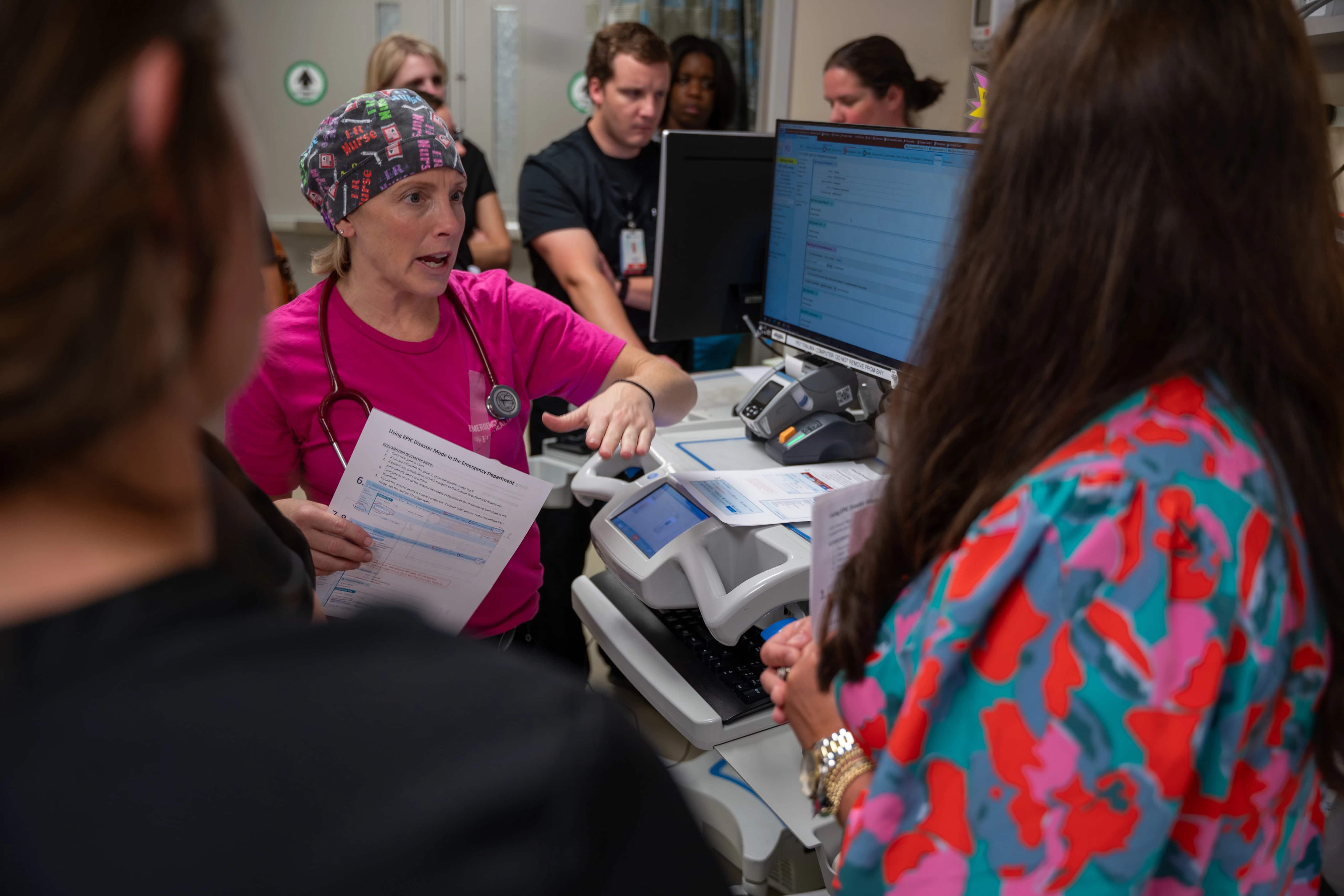
With the use of inflatable mannequins representing the both children and adult patients, the disaster drill consisted of 30-40 casualties brought to the ED following a simulated mass shooting at a local event. Drill participants worked through triaging the patients based on their medical status and moving them through the emergency care and surgical process, using real-time information like numbers of ORs and beds in use during the time of the drill.
For Dr. Eric Toschlog, chief of trauma and acute care surgery for ECU Health Medical Center and Brody and the rest of the emergency department team, preparing for those situations comes with the territory of working at the only Level I Trauma Center in eastern North Carolina.
“The ECU Health Medical Center emergency department serves as a hub for 1.4 million people who live across the region, which highlights the importance of being prepared for any circumstance imaginable,” said Dr. Toschlog. “The more we work to improve our process and understanding, the better prepared we will be to save lives.”
Those involved met immediately following the drill to debrief on the exercise, closely examining strengths and weakness, as well as plans for improvements, all in an effort to ensure the Medical Center emergency department team is well-positioned to provide high-quality care to the community during a time of dire need. The common thread throughout the event and debrief was the direct correlation between preparation and lives that could be saved.
“This was a great opportunity for us to test our knowledge and we certainly learned a lot of valuable lessons that will serve us well,” said Dr. Trisler. “I could not be more proud of the entire ED team for taking the time to participate in this disaster drill.”
Greenville, N.C. – Members of the U.S. House Committee on Ways and Means visited Beaufort and Pitt counties Monday, Oct. 16, 2023, to engage with the community, tour ECU Health Beaufort Hospital and ECU Health Medical Center, hear from community care leaders and discuss the challenges facing rural health care in America. The committee visit consisted of Rep. Greg Murphy, Chairman Jason Smith, and Reps. Adrian Smith, Kevin Hern, and Claudia Tenney.
“Whether it’s in my home state of Missouri or eastern North Carolina, rural communities are facing a health care crisis,” Chairman Smith said. “Today we heard from health care providers and local leaders about the struggles their communities face ranging from patients traveling long distances to receive emergency care to health facilities finding and keeping a quality health care workforce with the scarce resources available. On our current path, access to health care for a huge portion of America will continue to erode, putting the health of millions more rural Americans at risk. The Ways and Means Committee will take what we learned today from patients and doctors on the frontlines of this crisis and use it to inform the best way to expand access to health care in rural communities.”

Committee members and county leaders started the day by visiting Belhaven before touring ECU Health Beaufort Hospital, built in 1957 under the Hill-Burton Act that provided federal funding to support rural hospitals. There, committee members joined a roundtable conversation with ECU Health leaders and Beaufort County community leaders about the importance of finding collaborative solutions to the complex rural health care challenge.
The day concluded with committee members visiting ECU Health Medical Center in Greenville, a state-of-the-art academic facility that delivers high-level care to residents of eastern North Carolina. ECU Health Medical Center is the only Level I trauma center east of Raleigh, showcasing ECU Health’s unique system of care that serves as a national model for providing high-quality rural health care.
“Chairman Smith has been gracious enough to organize field hearings in the country this year on various issues,” said Rep. Murphy. “I am glad to have him and other members of the Ways and Means Committee spend time in eastern North Carolina to look at rural health care. We had the opportunity to witness firsthand the efforts of clinicians striving for quality in medicine while ensuring access to care for all.”
Throughout the tours, lawmakers walked through the emergency departments, intensive care units and labor and delivery units and engaged in conversations with clinicians regarding the challenges faced by rural health care, the aging infrastructure and the difficulties associated with sustaining essential services. Leaders discussed the importance of preserving services such as labor and delivery units within ECU Health, which are a lifeline for expectant mothers, providing essential access to safe and skilled maternity care, often in regions where other health care options are limited. Maintaining units like these ensures that rural families do not have to endure the significant burden of traveling long distances to access critical services.
“ECU Health has long advocated for solutions at the state and national level to combat the intensifying rural health care crisis facing America,” said Dr. Michael Waldrum, ECU Health CEO and dean of the Brody School of Medicine at East Carolina University. “We are pleased legislators not only recognize the need to explore solutions to maintain rural health care, but also recognize ECU Health as a leading voice on this important topic. The visit to Beaufort County and Greenville gave us an opportunity to show our mission in action, and we are deeply appreciative of the committee for spending time with us discussing rural health care.”
![§êÌ4 VYz½5Ñkã$¿òq³'Ô[¢veÐÆï¤DB³§ÍÐW28ø`Ò1ñMçÚíäuÓ@£CND£1-æ!^ÆÞkÝõW_N1´c§¨kO½Fa îÒú4¶
æÒÉöµTñÕx|9d!ÞÊ"Q¸m^ÚNmtx9* ô" NÙ$ßáÝ£MG*ðn@Ò|NÎ9*º··¿e´Jy¿#@ÁAb+ïLÇÕ
Q2¼×Íú3AtÆÅY-áªÛíäøåXynÇ4wÙ :üñÆ©RGFVé_[á¡ÿÖU¿.`tæ0ñ_ã,KÏ|ýes§kQiz|+Ís=NåØòýe$M'KÐN5YÒ;pL¬~Ñ¥@Rx|Ãåv9;(ãl£ÈúGÔ4·´îK V«/"U·§ÚæX.¼H¶ÑóRêYAøØ(B3Õ¸DÈÈö¦Y×$nåXøÅs&V(±)SRkkdI¤M*H
Y~t#¶S>lâU~¦é**Àl<r²È1åó74ëK{(áµAgÉÞI#äKP¨¯*{e' %Ø)æõK3ë[Å2TW&Ë!H¥Ó¦Iã¡Ûy?æºÍ¯ssÉé7²¸åô×12`â2ý.F<ÕQ®lf/0k¯ª=^2Æ1â(ÁJyoϦðÀ7|C³ H_ILE׿ßùæ®bÛwK¢ó&¿q¨Maos@HqÀµ7© wË#K)ÄsD¿4-ÊÅqºìyãZmCL£µn±%½²9-ÌOõÈXM"ó(Ì8üPTøä±â]"cÓv/uí[ñ¡ã¦Ï(wjPWímøµä¹³Ý¥^ZEÁÓþ59dy|ÃmF=9d/ á@Ì:åpÕBÏÙ.ÒîmfÄûàZC-ÅØ°4?:ò²L)ÛÉþ!¢ãÐõÉHòoÅV:°??*VNÎÐ+w5¦dc<L3a1×µ{ÚÎÚ^ÚÔBÑÆܨ§L8¨nQÕOÿ×}ªß}pZâQ³ÇǹíPs:ZQÍ×EkÚJùÙ3z(0Iô
M[5ú%#¨èÊL6s#[м¤Íyk4ìÆBÒ¸æv¨SÄ~2áË+>l
lW¾Q -õ86)Z£ü¬¤@ÓÂq£ ]>":¬¯O dOÔËøS¨£BMk½r¹óH^a^2²Ì0^ÿêZúÁY7§"§ÃžéBzµÓÆC·Ãb°´
!»D v éDP§]2L(¥d.ôÅ:b~bÚÂöWìT3#Eĸ5^FbæêÛêkß-i1ÝÁYçXÌãÈ19D£éG¥dN¹M6Çt8y¾ýiMäýiXóý!Óº°%'â|ÎÁ¢Ã&´F< ñú¢ÇµKÍBö[Û빺ÕåsSOࣲ¯Â¹¶§TM¥RÆÖ¬~d%ij'ùÒÎÅô ¾e·6!Uû@þñsW³±cþ:çÃ_¿ø¤ÃT×5mPúß¹Cö6áÑÛ½ßÿÐù×ÍóhÓ[gPyË)ÐúÍL<l[ϯ/äÔ¦ÊUfÚGU new)é~MÊÚ¬m7Z!ÏÕy]ÆXzwâ5ªÊëýâ·üy@â!»e9̼bº|iäãõÐÊyDÛmºäLX6HÛdU%~½Ì~¬ZäiØ-{M'êÈ©ð§l²/~¹ sHyGæuÓWz=
ÙÚ0#ýÐÉãñÿkíxdKt");ü°o0i×Zl³Q¬]f?ÅDí·óWøå"¨R¢l$×þqÔtZîæ-FHÄ=O#BKMò¹nYOMò®uÝ'N¼Bfæ[yÈ'º'¦Ôʧµ2wég]°´°_?¥tÍHÿëLÇÏȳÃõ=Ç×t8S¬Tñôù-GÏ*#Ò@ÛÚÿ¤ÇQ±9PíìÁou]#Í׳TG$íâ+ñ7WîËñs,rdÐOÝÔsÄA¢R¬;G5]¶lEÉìáÍ¥²^^ê6²AÊÆÖ{¾U$ÙÄdÿ¨9¾ÿðþ|ÞvV qKù¡ÂÖd1vðÌ¿6y£Ì`êºMª´è#û*йR9þÏÚ9N ¾g_¡ùßTÒì¿@ÉtÇC¸9&½ í$uû ûÅû-ö¾×Ú®Pú¬"Ãmæ©5·ú«pEÎ0 !¤PXÐ|&µ4Z¸GL¤G¿Ódñý êÞe·]fÓHk«K{%#-ÁûM²9NÑâ þ&P÷2þkÐuÏ?ÛùGË$EgÕf-´/Ñ@3IàgöÛáÍîÜéòß5y_[ÛëËÉîòåÜ]ÊwbRÿ*Ï4nÓÏ&ù¿UÓR[b7¸²°lĸ|~8öÿegJ% zd£/úªzæ&³®ÌI_®?ÝEö#E²*ñí¶npÆPu9 <ÒöÔç/kX×õÈi'®VY
rTÔ¬²O4]JVs m¨¯b3(mÆ_ÿÑåk¹kú3o¬Ê½Ê/à¹3r%¢á1ëPûäJSXG)=;0MÞÇ¢Î2169«ùkÏ6÷¢ÂjÆöÞVäÔGï,2/òÇ!@ÿ³pÊ"AÿU¿)<@sú¿£'¡¸øÌ°ÃrJëjAgb''¹sePyfho&UÒåNcýzdIl«j]§ þ¤ò?v¦U(KFëÆ´È Ý_1ëz§¯æI§äY¥jíË érFÛ3ïÉ]yí<ÙqjÌU.m%§J£ÐýcæÃ''j¼qÉ3ÊJÈ*»Ðnj2¶W³Ù¿ 59[OôxîZdcÝÌ,¦Ô^°¼P¼Rº?kß+¶MÄyÿµ}?êÚ6U ©âMTÐ7NlÄ=a1E·¦1ÖËñȤ'øÊj«21ØR}dy<§Í0¥Ï%Inn¹óÓ ÔaRúC%7vZU·`ÖX+ƵÜBv&¯íG)#ÎRámÒKJG¢Où»æ?ðç,¼±jôÔu gÔåhÆw¿ñþ?ßIN,CDG(U)#üO~æå!v â³¹½K6ÀrM22KÖüÑ®7¼¥mgæB.,Èôû}£OòóAæsþO«úÓþÿÅ;èfü®aûÌÓÿþkÉ }BíaæÅ¥5RI ~ÓÖ¿ñ¶n¡Ø:9HgrÉ5/0ÞjS¸WÄ«yI(¿«2âE²m*FkÈ@·@ÝkC@©u±fåÍ!äyÂþÏß×.Ä:µä^¯Z3 4JH{o1TRyr¹3~¦ùYJe¤Üà«/&ÈsÿÒämhíµíGn6Þ»èd!,Ì DÓ îJUþ$G¾?²N¶ÐôÛ/£[¹Ü@2Àñ5ëÓ+ÈLbHæÛRòzoéÛh,Ù[E¼GuaÌF*9n¨JýVî¥Âù´ô#_ë×zÚö»h°ÔÓ-@!äã,ªßgû)Ù6åÑÕ@ ú²'ÝCõ ò1ã²w^JÈ´æÐõß=LçFF·ë¶ñ7ôã§Âð?Õ=2AÇ1=ÌfòfPú£±øO,³HÝñÈÖϵm{=] ¿S£hÜIý ¶ea¸#(É®©¯®å²óN¬CuFKi:·ÝÎÌsLÐX[Üë%Y-TÕ·:t+[>÷»þKy'_Ó§Z»·úµ¥Ýej£*üÕyW¦bd³0z/ãRñJÓ]²ËqX極½ÕêHÿ^¡PH*½ËNê;æ6|qÜõoÅVDÑB&Ï¡hã$vÙwýx"}!¢²qá
'¬ú^#öÑzÄóÎEÎ/.iÖ1$)ªjÖÑÜøu¬Z©,Q9D¿ÿH±Í2 Gó)ç¯5Mæ8_êåÕKzzvñ|1ö{ÉþÏ6½@ů¤hÚ-÷,?^ ¤2![[ÜyÒk&{ÆZs¢ÔììþÇ(ÕÈf>W§ênÓ@þêUæM[Qó6½uyRÝ "B)!öKÇo)Ãbn«Ps϶þÿ6*hvü»ßónfâ»U6¶y;ÌÄÉÛlº,/J·YaY@6ñ¸%HûmMþjË!#äÆR
Ô$+HòDýOðÌE«Çs°ñ$ÒÒµ½ÈuÛ%Ú%V,iQ÷ä¢Ç*,ÂÞ[åd²Ltuå3V{ääÙoÿÓåÿvù¥½9%¼ZtõQ¿98µF|DéË)Zw]ËdÂÓPT´¼©$knÿËûÀdéOµW%Å|ÑîDé÷$I$ÇÐiJ¡9ƽía[¤Ì}aç¼Ñæ·µyM±;"6<ùÄÒHåðû´ÿdßäãÆ@:Ä·äÆb"zLqEª@§P¸QÈ;(è;3×æË ÐèqDâ! õH^gþz?õÌÌdþqsÍ÷eMîé{NÌÛÈ^hòõç ±Ò¹ÓY-æâÄHÊUç@fõQþ3c$-F'@Éy×Ìi¬ù½(âT².!RuST¯Òî}>ÖdÝ$7_(9Bhm¢®«ûÔÜéQ±ÉÒ D¼L>Ì®>ãúÆ ¼cóÿZý©yX»ótîußh} vÿ*UÌ}Dµæ;%!XȽ=mðÛN/,í#´hï8þÔv?~eÄp¹HÜL!´¦¸zásA]éóÊçà ó§ïü·æy4[×æÐÃÄÒ£àOÿ¢ËP°$`ÙrUÙëÜ(¥®LÂÎùYdè*Û8#½øóݲ/ÿÔäs×#Öõ»R(M¼s¤Aab ^(î=Æg4F$ØܱñqEì+÷bè«JiÀñZÓ¬¿ËRÛêw:mêÒé²YÚÌ×/»TzËéDárR>>¹®Ê9JGéÙÂG68cV>/ô¿ÂõA>:Èéy%ÅÇr`hÔ°©'lÐë! HÏð»)"#ÃÉ'ó]ü¯} (T·/³ÛlÂÓâGúÎNrx¹çþOý";fë[ÁᯱÕi¼QvüÁ¹ºW+úZmØøåý,'úÍ*Ê?ªÁ^Y§y%K$ z£áOPñ^Göy6EÕݧ>Y§ÖôÛZFææy4`8F§_Ùm± E¦£O´t«H¬tûk(+hÒ$g5b¨(*E3Zåpm°¡á¿~m¸ÈË4ëéÙ^)üFbäæ¬DÐzÑ®nUA:Ð$ïL9QR¶Ôɧ#jýù2¤'"@êèp0ÿç!tÍOVóMÕcåm¤i]ÝÊkÅ¿*WùØGð®ei2ñçÑZþÕ>{æÀqÐ>lXH¬vNCY´=bÏC×µ©àhíÁdF^_"W°âE>#_ÙûY9ÇüN~r<RûW§þ%ÝÌW)ɨÿ¦ì;ì¤C$G%{¥»±3DI¡¹òYÇäVjx1»¶2;&zµåO©Z©ÝHÞ¹<»53/ʨ[éZÏîxÇueÊ8¥xÀ1Ú²}øÁ2$Û³ÒDQ=ÌG_×õ1jÒëz³î.(¾+Â5éð 9±Çºu*¢Ó¸ãï±1S»·¾<ÒwÀT4ªYÀI¦S&qe¤PD!or@Ìkm§ÿÕás3Mé§Pîݼ>YcZáCLiWðä¤c%£òÓK¿´óïjðúð³Bd]N%OLÑöQ,fñ;®ÎÅ(dõôþ§§Ä@yþqÿÐϽÊf¶+μüknz·~-gbÜëÐó=®}þhý*:^OË¿0_ºÊoC8ªG§HTl]å2o$ÿ7ýóÅB¿¥ùsgëù»AE&ò'úó?äô¢?Sëø[á_Í;l(ycµ¹óôn¼I¤©îadúË>¦4`íiv¸1²ÍÀ1âM:áD¥FÂÑ'Õ¥ÃÛjc1ljÂ|²y¤z"0e4øR85 %T¡å_ø.Y9©³.£®ôýYE5¼Ñ´¡KsP¿:Ó24Ó¾Y¡=jSóD7ÓiãI¸æÝÌ|3éµý-×ífôån´@Ý=3Eü²Ó,4M4kÞ¡kÎW?²¯+eÿ)TÚÌs+-£ÌÎ/ÊrýÚ_(Å1ëéûÿÅñ³æk(Ë]ÄÒRõíã'Svcæh CËô Æ×Ì·Ýbâ¤Ò´®ù Ù#`º+yáÛd²2¼áÒ, ¯×½3/Í¢ye úK^¦7Åuùx_sA7ï`0%¹lGHÄ(%a{Éô/ééd·ImÉHV@ݺ×ÍiW2ÔQó{HÞ@!?ݳ%¯bGÅ2Ë+ÙÉ8õJnü¹u<wRFn¥5=iO÷êÌØrMô[hÕj{dk#uÑùqCWÕð8miº@nÿÆÑH{Í.që+Ô+Jÿíeº©_¥§nc?t?KÑ ´º½=ÁäHOÊÓýÕÂYü<RÿsêvØ2pcâû¿CåéA©H¿³îµöW#7úÑAf·ÛxÌÁ Âäxûk_Ãa´.28uEAðømúï%<äú
$N.:2î§øØqVÅÄ«Ý¢@hõelÁMc©)ZSz|ò5Ñ<][1
ÆjOÉDéïéÎÓÇÄÄÈvo#¡äFÃáÐÿÿ×ä_òBbÕ?+}Ê¿Epê
ÀÓ¡ dæOé=ìïð BÈäxþ×NMKUAÄw`¨ I=®òX£t^ÞKYï,n-àhd'E%ÜËÖ¹Xª'ȳÈéGï{o=ózÀT¢÷¬?â+Ù+á«ó9Qí`½¶y²×z#<§ÍnüÏtõ·Ä¦µ@~ë4c}Ï/¬7WË~ÓþP¶xtØát1²ÆëÄYµþ®ÔúOOõGêÌ#ÉÊêÊ-Y~¯ÿ!VkÜ5ÜîÓL®L¢F±dQ·r0!¯¯ZýêÁR¸êv¬«
êº
¼ª«~À~ÉÓs-¹;q#½ì1&Ì[+EA_ǦdåjÇ+.)*þ#¸Ëþbk2ÜYÙØÀ4v9@Áòª8£)èËþ)ÚáiLåÅçý1ÿ|ùãÏ$Ú-õ¤ß¹Ô-EЮôríÈoþIL¾98÷ºøiÅ<s3TùCØ2!ml$«P|N<@Þ(³Í8±Dhçd)¦Êµ§ãiż¦÷©Æe#äs;/0ãcä[qD¨9gF´<jDORÈÒ[=0Q®LÂè¨Ç`EkáQyžÓé5;Ï)'Gaá[hÿÐàeÌ×@#/ð«ÕÛlÉ!eÌ!E¸UQ¹' s°ùÉÖÚ=º^^F²j;Aý÷þfÌlâ÷2ý¡2 3ö
GãJ,ÁI|ÍäHî¯4Y&;µ©7_
½¾ÎRqǸ9ÔËaÇÊÚb4aI ®PrDtsÞ×GäË×qX[c]ã?ǬÓÌÚe¶ÜG¬1ÕArà³'&¦5N¯Úí´^ð/òY>«áàâfó¯Î0Çg£Ü¡·&ÝÜvG¯û(Êåzy¬ÏHy,¯J£¶e8Ìà:Tø+"ókQ·/Ëðbv/Bógí<µsi¦Ûô8eV5ç3ý¹píz77&'}H=ó7&î<wɳü«)Ûj; 4i,Ùr¹2%Ik*ê§1æ,6ÇGõPU¶ÌqoÏÿÑä^sò¾[Ö@(_N¸~vïA½Lu?áýOMN;ýIÍUÑ3ò·Zês`µjBC)ïþÀ~9~YíM@=J ëê[Nô 4òq±2G}tDEFöøZ@[J9mÝå5nl+íMPõ»ô"ÃÚÖ¿!Ôå4òÛëÞ[þÒn?0N©+ÖÀZ´k@)áQUäâ@ÎÞÁeujmô;ñ?Ó1ñE¶eåhߣ¼ós¯-½ºiaAeW£uç»W2É@Dêúmõµå¤wÕx¤è}ÆÄf)³u§i!à;`BâF0¬õ[Ýr*³Õ~ø¤ò·"+_U-Õg1+hǪþÓoòsc§¥ÃÊwGh5½+m#ÖGù·öfyqH+h upæI_âD5Øffè6_©çºL©?õiuÀTqßüÌé@õppg<`úKú^÷ª?:×B£9cõÎ6òO1ù_VÒP·1¯¦àG©V²XÏq9vHòÆ´?êô¦ß~7U¤dJB×sM².Imh.e.â5b(M7ö9i²1)K'ï)Ú+tÛÿÒçíPó ÂÐÁ(¹ü¸©{që×5}L!.nË>H ô4éZuµ
P1$SmËoüÇ6²$V[1'$S«sÂ?|¼lÍFÝ^Áf??isYwQPãeZíáÓ)rú'mÿ6
Ðh¸õýõ¿ßËx5ð´æ`HãJtÉD© g,xÈî:à[ÁH"¢$R¶À¨K¹ l0Rä)×|PWÚ
Aup±s¨N[VpR@'Õ|ÿ¢ÙÜ ^S?°ã1~Lüæ§mæ]:ÿPµ?ZN39!M?-FNgæËbáÃ÷¤jvþôíÀg$¤z¡®Zhë˲²×è9²Ä=!ÁÉvóémmc×nµ8'KÉ¡BÔ²AíÆ^|æQáîFGe9,H/Ôu[»2êÕËAâ¤uÌhósä<HÔ7ÍuLlmJ§
dt?ª¹Ld6}Qä@]ùwIºÿZÂ[æPWñÄìXôBùÛJêkdrDÁÖ#údL-/såZÇ-¸<ÅVQ³)ùÊy× 63}äM6 Kr;})fêÄbèË*A#¨fjç¦Z÷ýÆw*éZFês5©c¹ûÏL¥õBIù42::§eùü+ÿd°ÆíSTÂ82ÉVï×èï»M¿ÿÓ-óÜH°§#ñRiß-:lCCsä«)·/ 鶱(Smj¼Í7¬òû_ì²ÌâÌbl°JÐCSl(QbPåS;&«_M¶±
uWDÅk¿~¦È wX¶ãÌzXÜJHÿUBßÌÚh;sû¿®C?N+±àa³-ÑÑy¡Ù[~½*ÃøbT|Çv÷AD(µ=jNq'ë«Üð ñ ÃKn:¥Å*@ößêwŨ³;A!òíó9öär5²mr¬|$¨zFè`Ã$&Ò{+M¨/gàvxкË|AüØËùÅ»m?Nâa²ÝÐ"PoAÇP8¯©ëzÕÐku+|±>f¿ªÏ.q.CúÌÚÃJV,å¹5ù×-CFÔuM=-ìn.nc8ÝRÀëâïfó-8KFBÚXËeÒäÊZ&£ÉLs<ñ|=Agg¿àrX'ë!Ǥ¼þR]#éßñPòVQú³"|ÚC%ó!õ µ¸äø!"xVA¹C¿Ëý¬¸rAPÚ*z It`:`ºZ´-3-½½º¤<L´«Gìÿ.äiy:ÓL*F«ÉÇÙ}ÏóS&Cy·æ0â¦Z#7ùgàaËQ©Ö¡CXÿÔê°ù?È×zj¶öM2Eë¡ÝIB¼¾É4éGJEEy§@Òοqé¼½#¿¦´ü3UªÔçj1¸ÿ9ÎÓàÅ()z»ÔÒáCĶÚÆ.vû=ëCmfÚà
§|)2M4ß/ê÷ñLKG£HhHñËãEÇ¢1óoRòÆ£dD¬X þñ*h|¥FHã1a"·µ¸1;x|'+
RÇKÔ~°¯è=+âñÉVJ¤tXNÇÜP¨~²&É©âÀ~¬[ý§)Úß2OëÂoê*v1áðÝsè6¡xéÔk%X¦§ }^V2FÎ@â1d¶ü^þoÑïèÏ@«!@ûW²øl¾2y5zsy44]Oò]T°çé'¥®ýÐÉñqxãáqægÕ+òÛ_¸ZÜ-µÌ¼ÏûÄX@ê׿@ÊdòZwåõÝ
íôRgk¸f0Drjâøä6þl®#vÁ|4Yoä^«¾VÍim.dYS¸ÒEÿfT¤ÕLó_ô?`áÒÄs@HámÚ3Ñ·1ª¢è:|H¡*Ôí!mR! ;1¤¢¡2Ä8ZM¾À¹ÉIáÞhWó>¥ëyë¶þÔái"Ç KçÝSØæAAÿÕë¾ToWÉv15¨}S®fä;óh½Ø.½|_̺³ðÛ´éDDeFÒ_ÒrV©©ØüÆDPYËÇRNXÒKw<P<duSò'|ÇÍ:³lýt9L<ÁéVoëK·ØéñLÛ )½hÿNgipØâ.«5zBkÅhAÌÒ+GE8n~ã±È¤IÒZ,^îÑFbdÁÜåâÔt((õ^ÝFb¹vÅ#W«yÝð¡ -}CC¾*¤Õ¿Ómû}تÉ)Z{ãhPâÝE¾¥VO^ǪÁXAARK´ØpsݧL*ÄõÍ[pexÑ£ý6&¿êSL3QX` ^p(Q6¯~ äÁ¾¬àcÔ%:ÝÖ©$QXS'ð·*²Ût(Þ°ÓËK-y4õVK]AD+PÕ¬M¿^,J³Ì¸j£!G
G(ÙÕªRM.CÝ8ÄfXäáucdý¡¸ú2Ðæ}EØ8û²Â«¾PÜÀÅô øPäaÍ2;#n8â<æãaÓ®Jex÷æ% ÍLê(.-áò·Sÿpóc+óÌ¢ÒÿÖ](https://www.ecuhealth.org/wp-content/uploads/2023/10/12-Edit.jpg)
The way Dr. Aundrea Oliver met Abby Coderre was, in Dr. Oliver’s words, “fortuitous.”
Abby was a sophomore at East Carolina University when she needed surgery for a mass in her thoracic cavity. Dr. Oliver’s colleague received the call about her situation, but couldn’t perform the diagnostic procedure on her, so Dr. Oliver was asked to step in.
“We just kept going”
At the age of nine, Abby was diagnosed with Crohn’s disease, so she was no stranger to hospitals. As she grew older, however, she began experiencing unusual symptoms.
In high school, she noticed bruising on her legs, but she attributed those to being a dancer. During the summer before her sophomore year, Abby experienced chest pain, but an initial doctor visit diagnosed her with a pulled muscle.
“The muscle relaxer the doctor prescribed didn’t help, so my sister insisted I go to the emergency department,” Abby said. “They did an x-ray and saw my esophagus was pushed off to one side, so they did a CT scan. That’s when they saw the mass in my chest.”
“Her mass was located next to her pulmonary artery and had invaded her pericardium,” Dr. Oliver said. What was supposed to be a four-hour surgery ended up taking Dr. Oliver eight hours to remove as much of the mass from Abby’s body as possible. “We tried to remove the majority of the mass and basically did a full resection.”
As a result, the doctors were able to correctly diagnose her with lymphoma and provide the right treatment.
That decision, Abby said, saved her life: “Who knows if chemo would have been able to get all of it?”
While Dr. Oliver has performed countless surgeries, she said Abby’s story sticks with her. “She was this young, vibrant college student who could have been my daughter, and her case was hard.” Dr. Oliver knew she wanted to do everything she could to help Abby. “We just kept going – we weren’t stopping until we got an answer,” Dr. Oliver said.
Abby’s recovery was, as Dr. Oliver put it, “slightly miraculous.”
“We cut through her phrenic nerve, so she shouldn’t have a voice at all. She should not be able to cough. But she still has great function.” Beyond the physical recovery, Dr. Oliver said it’s been gratifying to see Abby succeed in life: “To see her become this wonderful, exciting, vibrant caring woman and to go from being a happy college student to a mature individual – that gives in a way that I can only hope for is impressive.”
After surgery, Abby completed a two-and-a-half year chemotherapy regimen. Dr. Oliver was impressed by her commitment to her classes and studies while receiving treatment. “I was really proud of her. Whenever someone has to work twice as hard in order to achieve success, there is a greater depth of value in that education.” Dr. Oliver was doubly proud when she found out Abby wanted to be a nurse. “I was over the moon,” Dr. Oliver said. “She let me know she was interested in doing pediatric oncology, and I told her it was a perfect fit, that she was bright enough and she had the people skills to be a great nurse.”
A struggle worth the effort
Although it was challenging, Abby said it was important to her that she remain in school while undergoing treatment. “I needed to have some normalcy in my life,” she said. It became even more challenging when she transitioned to the actual nursing program. “I’d have to get chemo one day, and then the next day I’d be in the hospital as the student nurse and not the patient,” she said. “Then the next day I’d take a test.” As a result, Abby had to study extra hard and often took her notes with her to study during her chemotherapy treatment. She also took classes and tests online, even taking a few while she was in the hospital. “I took one final exam while I was in the ER, but it helped me get my mind off what was happening and gave me something else to focus on.”
Although Abby said she wondered when her cancer journey was going to be over, she advised anyone out there going through the same thing to remember it won’t last forever. “What you’re working for is worth it, no matter how hard the struggle. Just look at the end goal and do anything you can to make it good.”
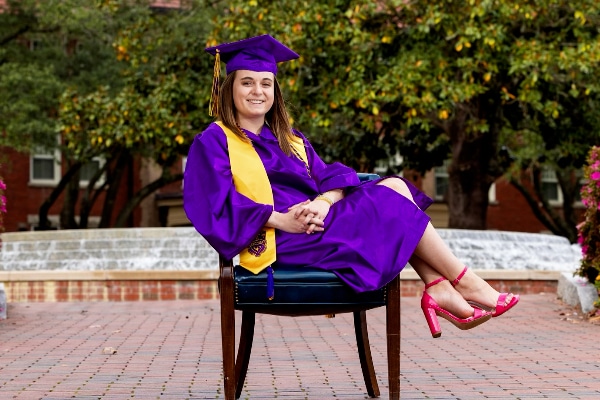
Abby rang the bell to signify the end of her cancer treatment in November 2021, and when she graduated from college, she invited Dr. Oliver to the celebration.
“It’s not common to be invited to a patient’s graduation,” Dr. Oliver admitted. “To have someone years later have an important life event and say, I want you there – that means everything to me.”
Bridging two worlds
Now, Abby is a pediatric nurse working at ECU Health.
“When I first started nursing school, I didn’t want to stay in Greenville,” she shared. “But I really fell in love with the hospital. The team I was treated by was amazing, and I saw the impact they had on me as well as other kids. I couldn’t imagine working anywhere else.”
While their professional lives may not intersect much, Dr. Oliver is thrilled to have Abby as a colleague: “Abby is the perfect container for life, and she’s going to give it to a bunch of little kids who are scared life is going to be taken away from them.”
Coderre agreed that bridging the worlds of patient and nurse gives her a unique perspective that has helped her be a better nurse. “It gave me a lot of empathy toward my patients, because I know what they’re going through. I know what it feels like to be on the other side of things. I wouldn’t be half the nurse I am if I hadn’t been a patient also.”
As for Dr. Oliver, she said the value of her work has been solidified. “It’s easy to feel like what you do doesn’t matter or doesn’t have an impact. If I never have another patient like Abby Coderre – if Abby is my one Abby – then my career is complete. That was the best eight hours I could have ever spent.”
Looking back, Abby said she wouldn’t be here if not for her ECU Health team working together.
“I couldn’t say anything better about ECU Health. It’s amazing, with the best nurses and doctors.” She also holds a special place in her heart for Dr. Oliver: “She is just an amazing human being.”
In her ECU Health profile, Abby wrote that her role model is “Dr. Aundrea Oliver, the most amazing surgeon and person that has ever graced my life by saving my life.”
Health and well-being are at the very heart of creating economic vibrancy in a community. That is why Brian Floyd, chief operating officer of ECU Health and president of ECU Health Medical Center, joined a group of statewide health care leaders at the NC Chamber Health Care Conference on a panel titled “Working Together to Create Healthier Communities” on Sept. 14 in Durham.
Speaking to a packed room of health care, business, industry and government leaders from across the state, Floyd spoke about ECU Health’s unique position in eastern North Carolina as both the largest health care system and employer in the 29 county region, and the importance of maintaining high quality and high value care in rural communities.
“Thinking about the NC Chamber and what we’re here to talk about today, it’s important to remember North Carolina is the second largest rural state in the country,” said Floyd. “One-in-three people in North Carolina lives in a rural community so rural health care is a very critical and very personal endeavor. At ECU Health, we take our mission seriously to improve the health and well-being of eastern North Carolina, which is a region with some of the highest levels of poverty in the state.”

ECU Health is a leader in rural health care, Floyd said, and is constantly exploring new ways to improve access to care for rural communities. Speaking to topics such as improving mental health resources, partnering closely with schools, colleges and universities and investing in the health and well-being of team members, Floyd made it clear ECU Health’s role in the East goes far beyond just delivering health care.
“ECU Health is a health care provider, an educator and an economic engine for our 29 county region and we understand that collaboration is key to solving health care challenges,” Floyd said. “When I think about what we do, the reason we have a 974 bed hospital in a town of more than 80,000 people is because of the tremendous burden of disease in the communities we serve. Improving quality and cost is our goal and our clinical care component certainly plays a role in that, but we know that value is created by improving wellness through initiatives that tackle social determinants of health.”
Floyd was joined on the panel by Dr. Art Apolinario, board president of the N.C. Medical Society, Dr. Creagh Milford, senior vice president of retail health for CVS Health and Jennifer Sacks, associate director of the clinical operations program lead for Biogen. The panel was moderated by Gary Salamido, president and CEO of the NC Chamber.
Greenville, N.C. – ECU Health and the Brody School of Medicine at East Carolina University’s Lora Joyner was recently selected as the National Bleeding Disorders Foundation (NBDF) Physical Therapist of the Year. Each year, NBDF honors those who have made significant contributions to the inheritable blood and bleeding disorders community at its annual Awards of Excellence program.
“It is an honor to be recognized for my life’s work as a physical therapist in the bleeding disorder community by fellow therapists, health care professionals, patients, families, and HTC colleagues,” said Lora Joyner, MS, PT, PCS, physical therapist and clinic manager at ECU Health Hemophilia Treatment Center (HTC). “I am grateful that my name will be associated with Donna Boone and previous award winners and recognized as a role model and mentor for current and future health care professionals in the bleeding disorder community.”
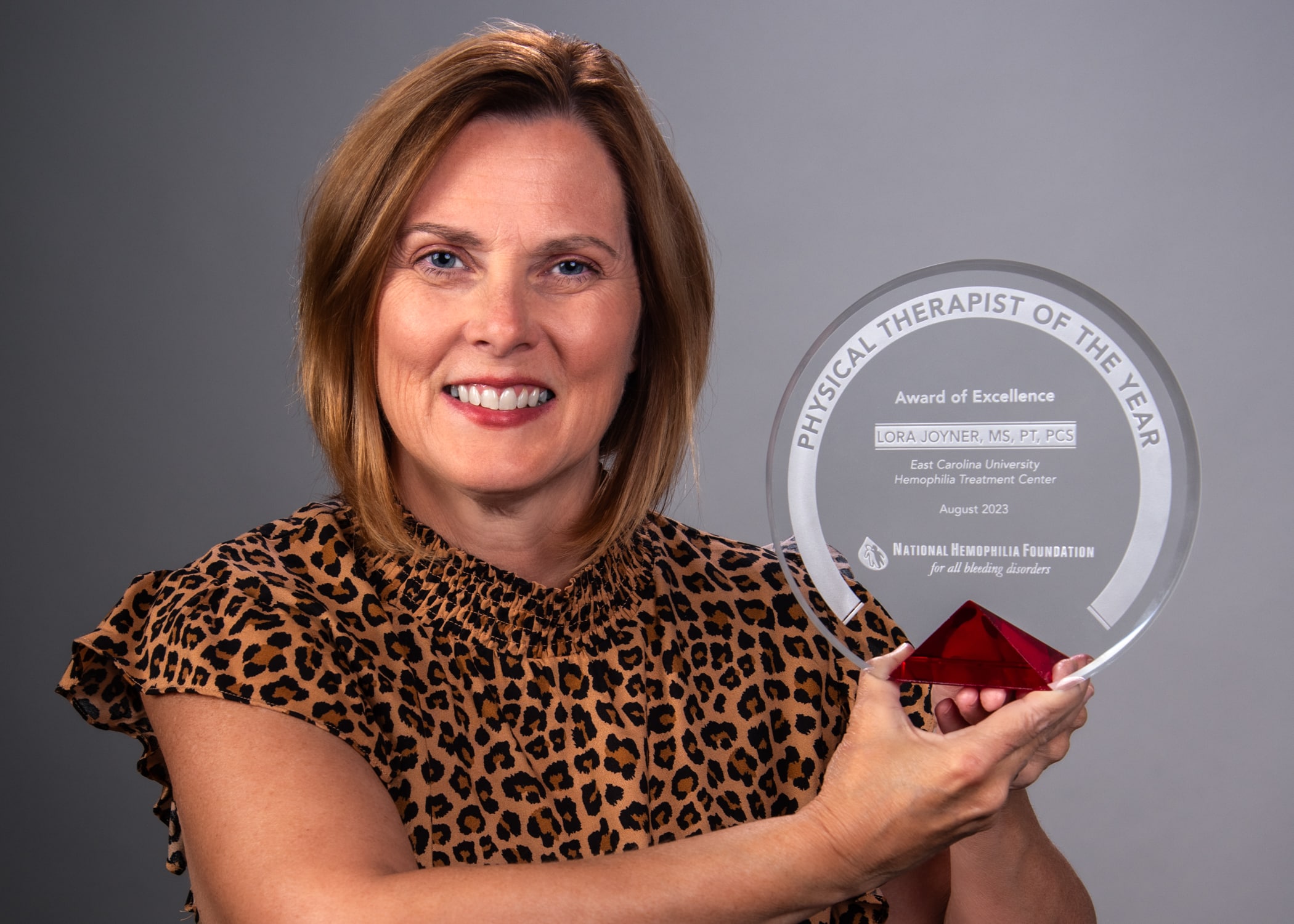
Physical Therapist of the Year, given in honor of Donna Boone, PT, honors an individual who has demonstrated service to the inheritable blood and bleeding disorders community above and beyond their daily responsibilities in an HTC PT role. This person serves as a role model for others in the physical therapy field and has a minimum of two years’ experience working with individuals with blood or bleeding disorders at an HTC. Donna Boone was a pioneer in physical therapy and bleeding disorders and served as a mentor for many professionals.
“We are proud of Lora for all of the hard work, dedication, and leadership she has put into this clinic and into our patients,” said Dr. Beng Fuh, director of pediatric hematology and oncology, “Bleeding disorders, sickle cell disease and cancer are life-changing diagnoses for patients and their families. Lora is an invaluable asset and works hard to ensure patients can live their best lives as possible after diagnosis. Lora’s passion for her patients is reflected by this well-earned achievement.”
Joyner has worked at ECU Health HTC for 32 years as a physical therapist and as the clinic manager for seven years. As HTC manager, Joyner is responsible for selecting patients for clinical trials and research, supporting transition needs of the clinic, quality improvement and writing grants and reports. As a physical therapist, Joyner is responsible for treating any muscular skeletal complications, most commonly joint or muscle bleeds. If left untreated long enough, joint/muscle bleeds can cause chronic pain, long-term joint problems and limited mobility. Joyner also facilitates safe participation in sports and physical activity of patients, including medication management, which allows patients to live an active and fulfilling life. Additionally, Lora has held leadership roles in multiple regional and national organizations. She is the currently the national chair of the physical therapy committee of the NBDF.
“When you see the joy on the face of a little one when you say ‘yes you can play baseball’ after their diagnosis, after they’ve thought they wouldn’t be able to do normal activities, that’s one of my favorite parts of my day,” Joyner said. “All parents dream that their children are able to do normal things, and I’m able to help children do that.”
ECU Health HTC is a nationally recognized comprehensive lifespan clinic with both adult and pediatric specialty services that is one of only three in North Carolina and is part of a national network of over 140 Comprehensive Hemophilia Diagnostic and Treatment Centers, which provide comprehensive specialty care to people with rare inherited bleeding disorders and their families.
KENANSVILLE – You could say Jon Kornegay was born to be a rural doctor. His father was a physician in a small town in Duplin County in eastern North Carolina. His mother was a graduate of East Carolina University’s first nurse practitioner class in 1976.
But it was his experience at ECU’s Brody School of Medicine that sealed the deal.
“Even early on in my medical school I saw the emphasis on service. You see other members (at the school), attending physicians and professors, who live that life and lives of service,” he said recently during a break from his job as a hospitalist at ECU Health Duplin Hospital in Kenansville. “Then you get exposed early on to underserved areas and populations and see how rewarding that can be.”
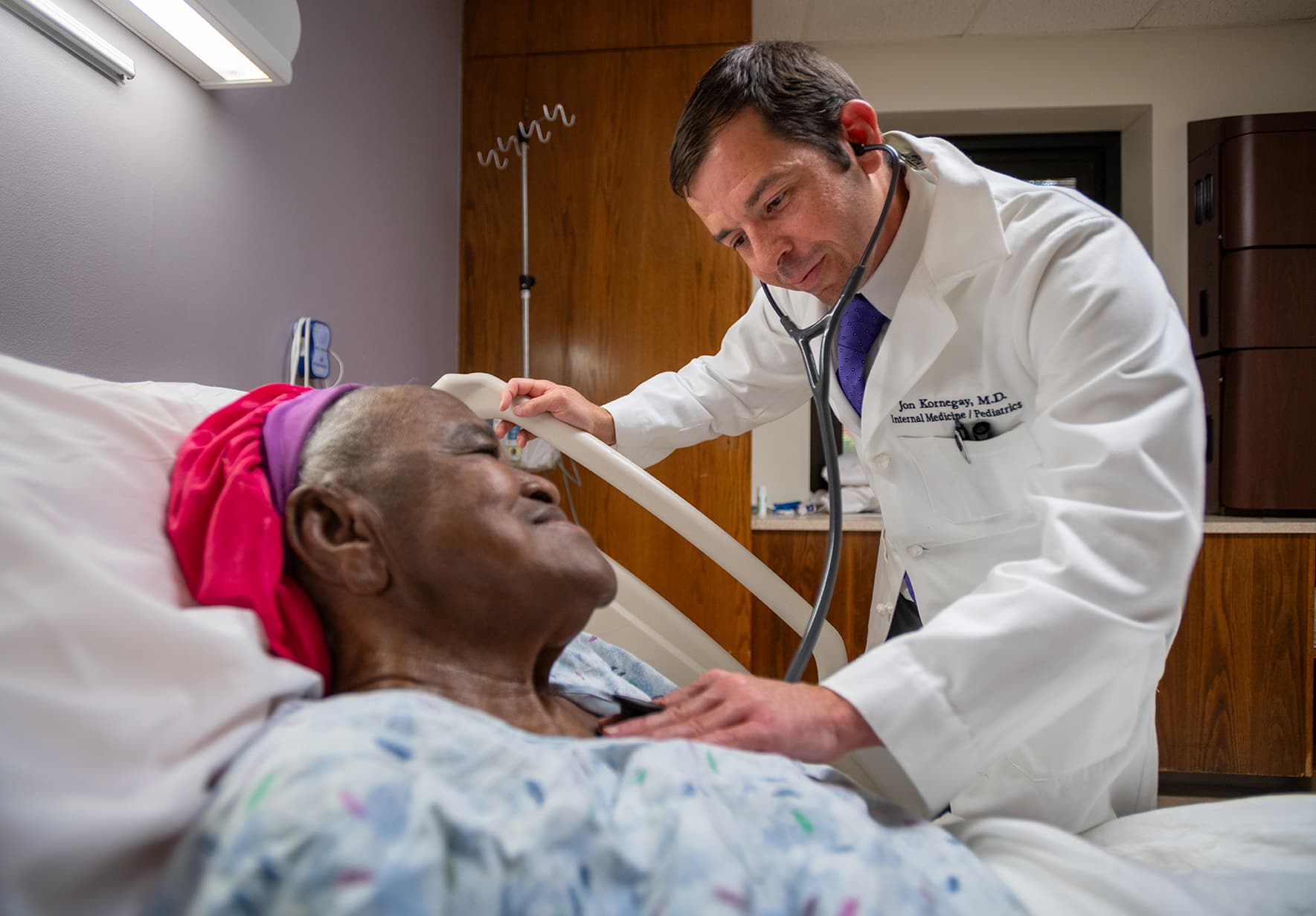
ECU’s medical school was established in 1974 after successfully making the argument – contentious at the time – that it could fill a need in North Carolina to train more primary-care physicians, rather than medical specialists, and find more doctors willing to serve in places like Kenansville.
Since then it has made good on that promise: according to the American Academy of Family Physicians, Brody ranks second in the nation among medical schools in the percentage of family physicians it graduates. The school admits 86 students to each class, all from North Carolina; this year, 52% of Brody’s graduates entered primary-care residencies.
“Developing great primary-care providers for rural areas is at the core of what we do at Brody and within ECU Health,” says Dr. Michael Waldrum, dean of Brody and CEO of ECU Health. “We have students, professors, residents and doctors who really understand that side of health care, and their work in that space leaves a legacy that we can all be proud of.”
A reliable supply of physicians and medical professionals is a critical part of the economy of any rural community:
- Having primary care close to home means residents are more likely to seek treatment for medical problems before they become crises and less likely to have to leave home to get treatment, resulting in fewer missed days of work and better quality of life;
- A healthy medical community is an important selling point for developers recruiting new businesses and for families trying to decide where to move;
- Rural hospitals are among the biggest employers in a county; since 2005, 12 rural hospitals have closed across the state, part of a troubling national trend;
- And medical professionals contribute in other ways. Kornegay also serves as the county’s EMS medical director; one of his colleagues also serves as county health director; other medical professionals serve on chambers, chair charitable boards, and coach sports teams.
Kornegay knows work in rural health care is not for everyone: Physicians can generally make more in cities in highly specialized fields; rural areas don’t offer the same amenities. Overcoming those barriers, he says, will require a variety of approaches, including improved salaries, help with loan repayment, retention bonuses and Medicaid expansion.
But in the meantime, Kornegay finds some people fall in love with work in rural areas, for the quality of life, the chance to get to know patients and neighbors in a deeper way, and for the opportunity to solve a wide range of health concerns.
Kornegay, certified as both an internist and a pediatrician, will often move from a geriatric patient in an ICU to a newborn down the hall.
“If you can get doctors into rural settings for a little while – get to know the environment, get to build their social network, get that experience … you have a chance to keep ‘em,” he says.
Something’s working in Duplin County. All five full-time physicians in Kornegay’s group at Duplin Hospital either went to med school or did their residency at Brody. They join a cadre of other ECU grads in health care and other fields who put down roots in the county.
“There’s a lot of purple and gold here,” says Kornegay. “That’s for sure.”
Further reading on Higher Ed Works
“Eastern North Carolina needs us”: The economic impact of ECU
Greenville, N.C. – ECU Health Medical Center recently earned accreditation from the Commission on Cancer (CoC), a quality program of the American College of Surgeons (ACS). This accreditation means patients will receive comprehensive, personalized care provided by a team of specialists working closely together, access to information on clinical trials and new treatment options, ongoing monitoring of care and lifelong follow-up, mental health support, financial guidance, survivorship care and other long-term services.
“I am proud of our ECU Health team members and physicians who work hard to provide the most advanced cancer care to eastern North Carolina,” said Brian Floyd, president of ECU Health Medical Center and chief operating officer of ECU Health. “Cancer is a terrible disease that has touched most, if not all, of us in some way. As a regional academic medical center, ECU Health Medical Center strives towards excellence in all it does. This accreditation is a testament to the tireless efforts of our cancer care teams, who make a difference in the lives of so many in our region.”
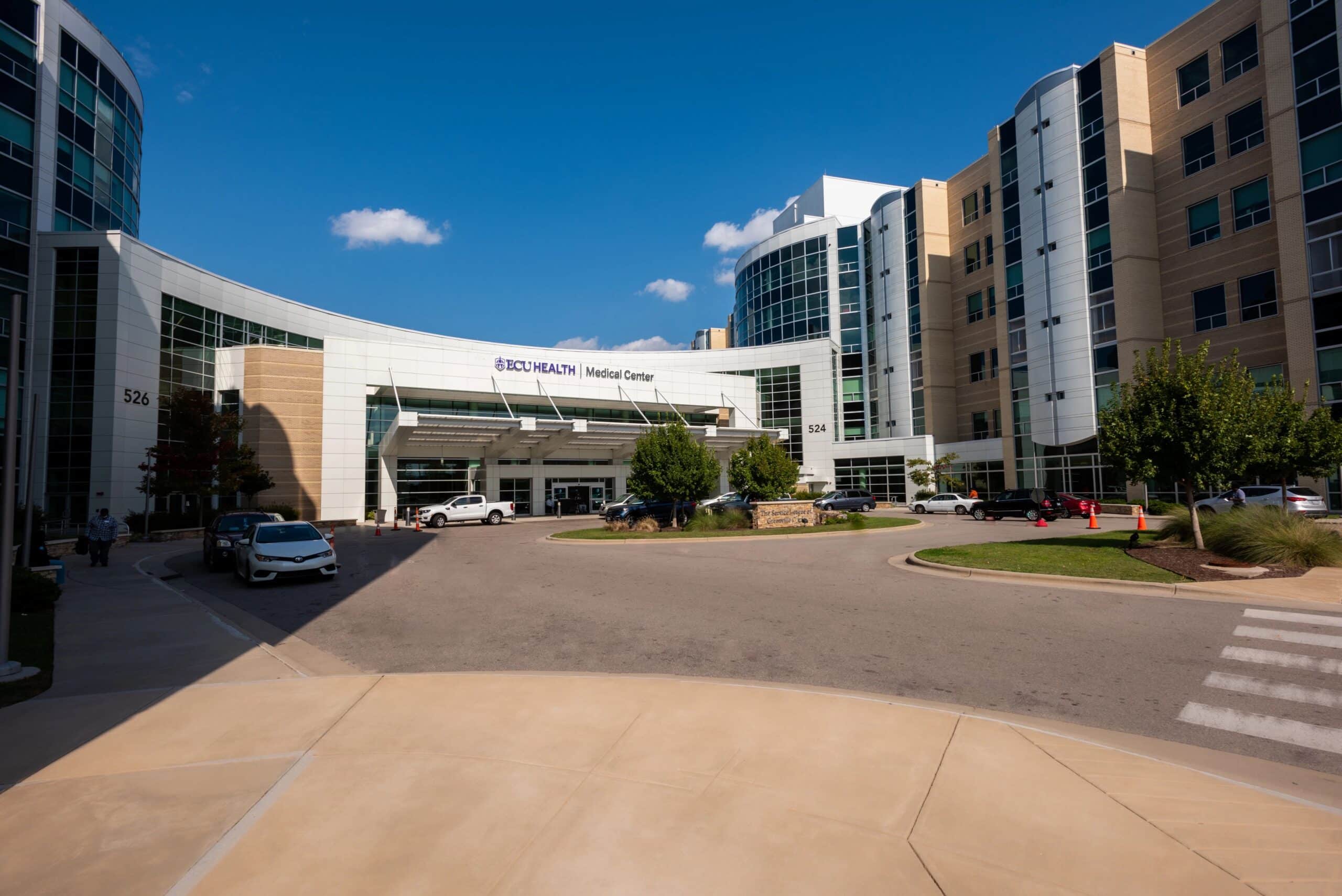
As a CoC-accredited cancer center, ECU Health Medical Center applies a multidisciplinary approach and treats cancer as a complex group of diseases that requires consultation among surgeons, medical and radiation oncologists, diagnostic radiologists, pathologists, and other health care professionals that specialize in caring for cancer patients. Cancer patients benefit from having access to clinical trials, screening and prevention events, palliative care, genetic counseling, rehabilitation, oncology nutrition, and survivorship services.
“Eastern North Carolina faces a disproportionately high rate of cancer, and as the largest health care provider in the East, ECU Health is committed to maintaining excellence in the delivery of comprehensive, compassionate, patient-centered, high-quality care for patients with all types of cancer,” said Dr. Darla Liles, Cancer Committee chair at ECU Health, professor and chief of the Division of Hematology and Oncology at the Brody School of Medicine at East Carolina University. “This accreditation demonstrates our holistic approach to cancer care that includes preventive measures, educational resources, clinical trials, support and survivorship services and treatment with the latest technologies and highest clinical standards.”
According to the American Cancer Society, more than 1.9 million new cancer cases and approximately 609,820 deaths from cancer are expected in 2023 in the United States. Of those, 67,690 new cases are expected in North Carolina. Residents in eastern North Carolina have access to ECU Health’s cancer care network that spans across nine hospitals – including the Eddie and Jo Allison Smith Tower at ECU Health Medical Center in Greenville that is home to both inpatient and outpatient cancer services – five radiation oncology sites, three joint ventures and numerous outpatient clinics.
“The Commission on Cancer brings together experts and advocates from across the country to develop standards for cancer care so that patients with cancer receive the highest quality care coordinated by a team of dedicated physicians and specialists,” said Timothy Wm. Mullett, MD, MBA, FACS, professor, general thoracic surgery medical director, Markey Cancer Center Affiliate and Research Networks University of Kentucky, and chair of the Commission on Cancer.
Lifelong dreams came one step closer to reality for the newest class of students in the Brody School of Medicine at East Carolina University as they were officially welcomed during the school’s annual White Coat Ceremony on Friday.
The 90 members of the Class of 2027 — all North Carolina residents — were helped into their white coats during the traditional celebration at the Health Sciences Student Center and regaled with messages and well wishes from Brody faculty and leadership.
Kristel McLawhorn, transplant nephrologist and 2005 Brody alumna, gave the keynote address, urging the Class of 2027 to stop, listen and absorb the knowledge and experiences they gain in the coming years.
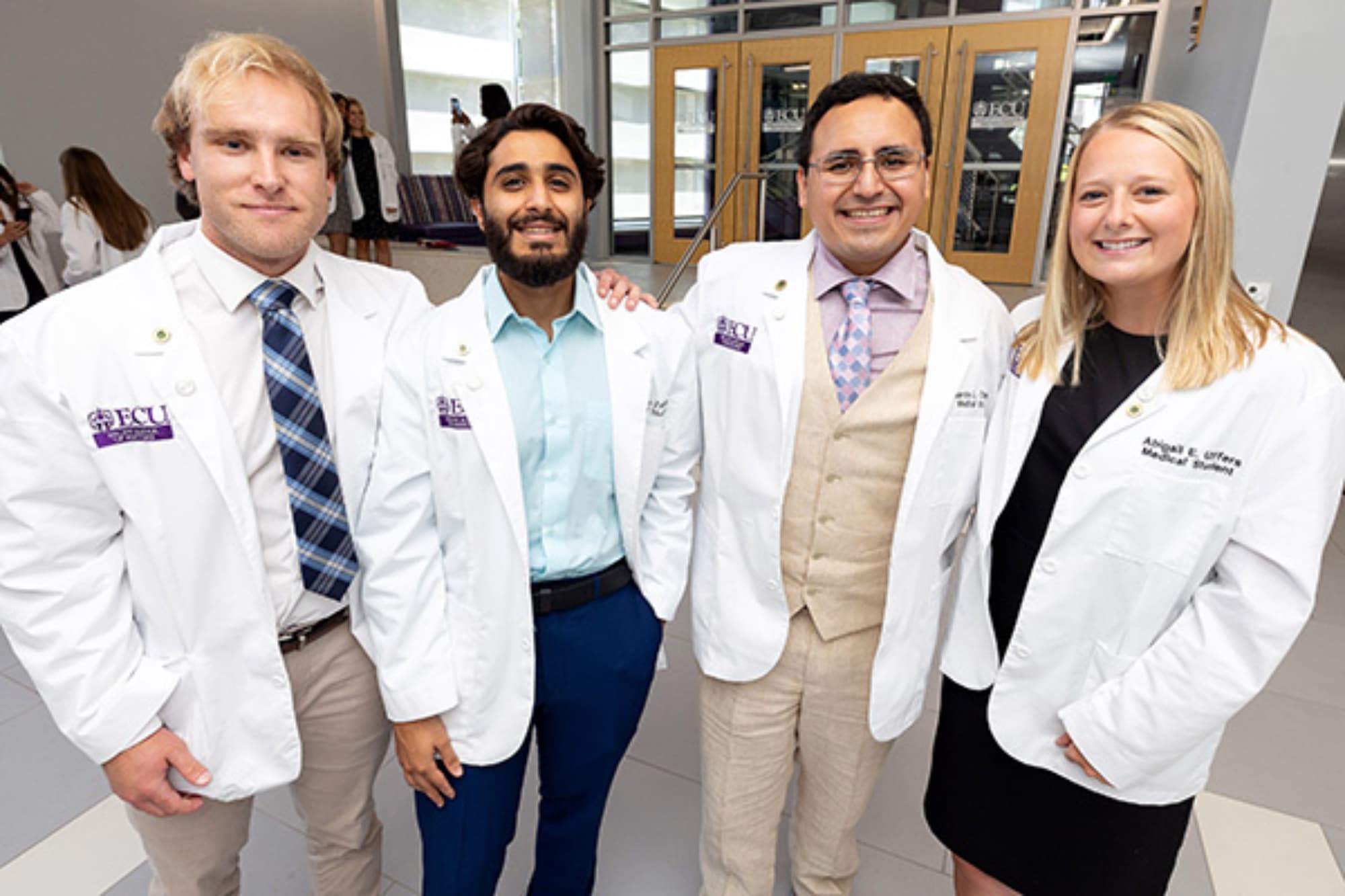
“You have earned this opportunity,” McLawhorn said. “My charge to you is this: Be prepared for anything: to be challenged, to be afraid, to be humbled, to serve and to change. Know where your support is and know what is mission-critical in the big picture. Have the grace and wisdom to know when you don’t know, and the drive to do something about it.”
McLawhorn told the students that during her intern year at Brown University after she graduated from Brody, she got an early-morning phone call that her father was gravely ill. Knowing what she did about medicine, she jumped in her car and drove 700 miles south, knowing the odds were stacked against her father. But with her medical knowledge, she held out hope.
“My dad survived that event,” she shared, “and is actually sitting here with us today. Can you stand up?”
The crowd cheered and applauded as McLawhorn’s father, John Jernigan, stood and waved from the first row.
“I was clinically sound before; I left ECU with a strong base of medical knowledge, and I was working hard to hone and craft my skill at Brown,” she said. “But his illness taught me a great deal about life and even more about doctoring that no institution can teach you,” including empathy, ability to listen, sharpened knowledge and agile teamwork.
“My dad taught me that every day is a good day, and some days are better days,” McLawhorn said. “Today is one of the better days. It’s a marker in your life and education, a point at which you are living the consequences of your previous choices. You’ve worked hard for the opportunity.”
The Class of 2027, the largest class in Brody history, hails from 36 North Carolina counties and 26 undergraduate institutions; 61% of the class is female, 16% are first-generation college students, and 21% are from minority groups — Black, Native American and Hispanic or Latino — that the Association of American Medical Colleges considers “underrepresented in medicine.” Four are veterans, and four were collegiate student athletes. The class speaks a total of 23 languages.
Jason Higginson, executive dean of Brody, formally welcomed the class and voiced confidence in the students’ future contributions to medicine.
“Today we welcome you to the study and art of medicine, a profession symbolized by the white coat,” he said. “We know you will do great things.”
Onolunosen Abhulimen
Onolunosen Abhulimen — her family and friends call her Ono — doesn’t have time to wait for things to happen.
The Brinkley-Lane and early assurance student, the daughter of Nigerian immigrants, graduated from high school in Winston-Salem with an associate’s degree under her belt — the first in her school to do so. Since she pioneered the path, other family members have followed in her wake, including her two younger brothers, who are also Brody Early Assurance students — one a sophomore and the other a junior. Her youngest brother will start fourth grade in the fall of 2023.
Abhulimen played basketball on her school team and a travel team. She did the same with track, where she ran the short distances. That wasn’t enough, though. She picked up the shot put and then the discus, which she fell in love with and would have broken the school record had the COVID-19 pandemic not shut sports down.
She excelled in the classroom as well. Having to navigate traditional high school classes, driving to the community college, and juggling sports and clubs taught her life lessons that would set her up for success in college: discipline, organization and commitment.
“It was hard for me to seek help, to ask for advice. There were some barriers that had to overcome,” Abhulimen said. “I definitely had to learn time management.”
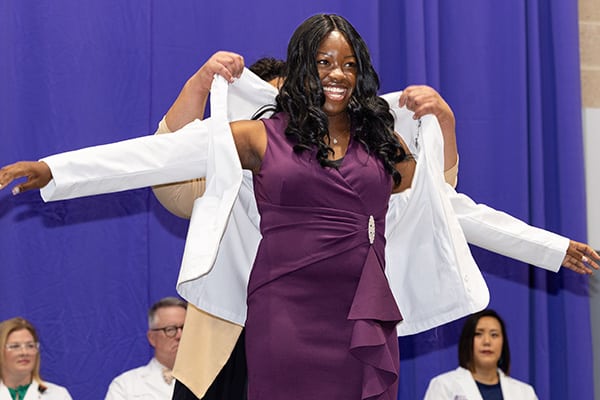
During high school she knew she wanted to pursue some kind of medical career. She attended a medical student symposium at Wake Forest University and heard a presenter talk about health care disparities, which was a new concept for her. Investigation and research solidified her plans — she wanted to be a doctor, enough so that during her undergrad years at ECU she founded a Students for Equitable Health Outcomes organization.
“I want a leadership role, to use my experience in helping those in rural communities get better health outcomes,” Abhulimen said.
Because she graduated high school with a pocketful of college credits, she was able to graduate from ECU summa cum laude in December 2022 with a degree in biology with honors in five semesters. She’ll start her first year of medical school at 21— most of her peers who will be a few years older — and after a semester’s break that she used to get her head in the game.
“I wanted to make sure I was really prepared and I was familiar with people that I could seek help and advice from. Brody is a very welcoming environment where it’s easy to ask for help or advice from other students,” Abhulimen said.
When she donned the white coat for the first time it was with pride and a sense of accomplishment. And her family beamed from the audience — her parents, all three brothers and a slew of aunts, uncles and cousins.
“It’s a representation of everything I’ve had to do to get to this point, even before high school. All the sacrifices that I made, being able to really study for those hard classes, some of the all-nighters I had to pull — I’m finally here,” Abhulimen said. “It’s like a breath of fresh air. I’m starting a new journey.”
Jose Robles Arvizu
Learning to navigate opportunity has given one first-year medical student a layered perspective from which to change the lives of his future patients.
Jose Robles Arvizu was born in Rio Verde San Luis Potosi, Mexico, and moved to Hendersonville when he was 2 years old. Over the years, he observed the challenges facing those around him and started formulating plans to make improvements in his community.
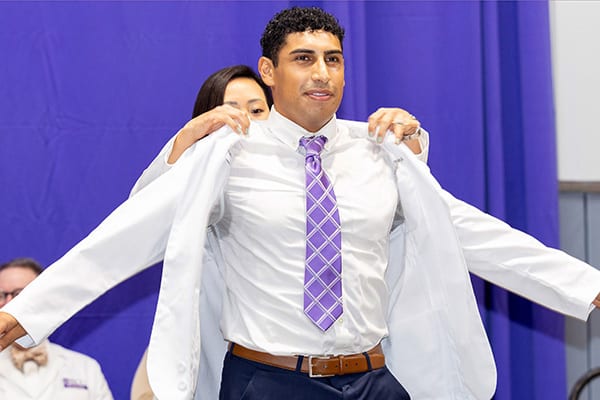
“Growing up, I saw how people in my marginalized communities, particularly farm workers and migrant farm workers, were often spectators in their health needs as a result of their lifestyle and barriers to accessing health care,” Robles Arvizu said. “I knew there had to be something I could do to bridge this gap and empower these communities to become stake holders in their health and make it a priority. This fueled my desire to become a physician with the goal of returning to western North Carolina to make a positive impact in the communities in the place I call home.”
He later attended UNC–Chapel Hill as a first-generation undergraduate, then went to Wake Forest to get his master’s in biomedical sciences, research track.
“One of the things that I am most excited about is being part of the incoming Brody class is becoming a member of a larger family that has a common goal of improving the health of communities across North Carolina,” he said. “Even within the last few days getting to know more people, it is more evident that we all have a ton in common, and I’m excited to embark on this journey with the rest of my classmates.”
Robles Arvizu has come to view education as a lifelong opportunity that can benefit those around him, making health care — and education — more accessible.
“Being a first-generation college and medical student brings both challenges and opportunities,” he said. “I would aim to use my experience as a first-generation student to advocate for others in similar situations. Understanding the unique challenges faced by first-generation students, I could contribute to making the education system more inclusive and accessible.”
Because of his motivation and perseverance, Robles Arvizu was named a Gates Millennium Scholar. The program, funded by the Bill and Melinda Gates Foundation, provides a full scholarship to any undergraduate institution to students from underrepresented groups. The scholarship also covers master’s and doctoral studies in the disciplines of computer science, education, engineering, library science, mathematics public health, and the sciences, where these groups are severely underrepresented.
“Being named a recipient of the Gates Millennium Scholarship one of the largest blessings that allowed me to peruse my dream of becoming a physician without the immense financial barrier that many first-gen students encounter,” he said.
As he begins medical school, Robles Arvizu plans to use his life experiences to be empathetic to his future patients’ barriers and circumstances.
“Having faced my own challenges and adversities, I would use these experiences to relate to my patients and their struggles,” he said. “This empathy would help me provide better care and make a positive impact on my patients’ lives.”
Grant Irons
The Class of 2027 includes a student whose family has already built a legacy in eastern North Carolina health care.
Grant Irons is the great-grandson of regional health care pioneers Fred and Malene Irons and the grandson of Tom Irons, professor emeritus of pediatrics at Brody, medical director of Access East and the N.C. Agromedicine Institute, and interim medical director of physician assistant studies.
Grant Irons was born and raised in Greenville and attended UNC–Chapel Hill, where he earned a degree in biology with minors in chemistry and health and society.
“It is truly humbling to carry on my family’s legacy here in eastern North Carolina,” he said. “I was lucky enough to spend time with my great-grandparents, Drs. Fred and Malene Irons. As I’ve grown up, I continue to learn more about their work and the impact they had on health infrastructure in eastern North Carolina. Their legacy demonstrates the impact of servant leadership. My late grandmother and grandfather, better known as Carol Irons and Dr. Tom Irons, continued this tradition of selfless service. I would not be the man I am today without their guidance as I aim to hold myself to their standard; a life lived with compassion, and humility.”
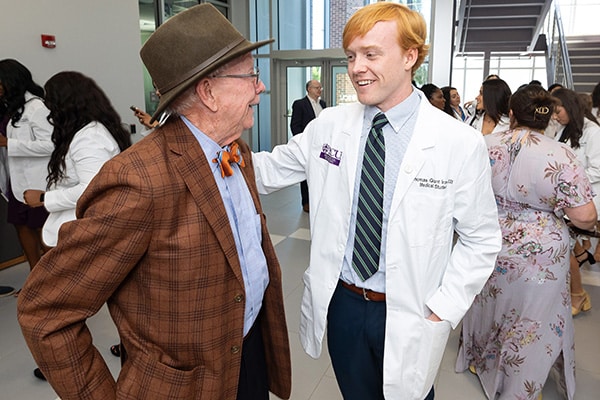
Tom Irons said he could not be prouder of his grandson’s desire to serve as a physician.
“I’m Grant’s only living grandparent, but I like to believe that today the other three are wearing smiles as big as mine,” he said. “His parents and I could not be more grateful that he has been given this opportunity, or prouder that he has chosen to come to Brody and eastern North Carolina.”
He added that he encourages his grandson and Grant’s classmates to follow their hearts.
“There is nothing easy about this journey you have undertaken, but if you put your heart into it, the rewards will be immeasurable,” he said. “Keep your head down these first two years, lean on each other, ask for help when you need it and never forget that there is no life more noble than a life of service.”
Grant is eager to live out a legacy and mirror his grandfather’s ideals and impact in medicine — but he is also ready to make his own name through the medical school that represents a life goal.
“The opportunity to be a student at Brody means the world to me; it has been a dream of mine for some time,” he said.
Grant Irons sees the bigger picture of eastern North Carolina’s health care landscape and also plans to make a difference through policy.
“Regardless of my career path, I have long been interested in health policy,” he said. “Initially, I was exposed to the importance of institutions through my family. Since I was old enough to understand, I have been fortunate enough to learn about care disparities and their impact on health outcomes.”
As a student at UNC-Chapel Hill, Irons explored the relationship between power, policy and differential health outcomes. He helped lead a chapter of PIH-Engage, a global health organization dedicated to building sustainable health infrastructure. That experience has led him to lead on a variety of fronts.
“As a physician I want to be more than a care provider; I hope to be a leader in my community,” he said. “While significant progress has and continues to be made, care expansion efforts are far from over. There are far too many people still in need.”
Lachlan Younce
Something about home — both places and people — helps to decide our futures for us.
Lachlan Younce is about as eastern North Carolina as a guy could get. His father’s family is from Belhaven and his mother’s is from Vanceboro. He played football and lacrosse at J.H. Rose high school in Greenville. He was a sailing counselor at a YMCA camp in Arapahoe, on the Neuse River, which will become important to his story.
At the camp he made friends with another counselor, a young man who ran a lot and worked out. Younce asked his friend why he was so fanatical. The answer — he was getting ready for the U.S. Naval Academy. Younce isn’t from a military family and had no idea what that meant but got very interested.
Younce applied for an appointment to the Academy and received one from the late Representative Walter B. Jones, who Younce recalls fondly. His initial attempt to get into Annapolis didn’t work out, so after graduation he headed west to Raleigh where he was part of the ROTC program at N.C. State, which he said was a blessing because he learned about military culture, which was completely foreign.
The next year his fortune changed and the Navy accepted him as a Midshipman.
Like many young men entering the academy, Younce wanted to be a pilot. He had his mind on studying political science; instead he took his first physics class, majored in chemistry and applied to the medical corps track.
He graduated in May 2023 as an ensign, and the Navy told him he could apply to any medical school in the country. He applied to three, but there was only one he really wanted to receive an acceptance letter from.
“I had the best interview experience here at Brody, I just felt like I was at home. This community raised me, built me and I think that learning medicine here is going to be extremely rewarding,” Younce said.
He’s not completely sure about what specialization he might pursue after graduation, but Brody’s mission of educating the next generations of primary care physicians impresses him.
“I think it’s great that a school so oriented towards primary care can train a physician to go into the military and provide care that service members need,” Younce said.
The winding route that brought him home means more than just place. Health care is a thread that is beginning to be woven into the fabric of his family. His mother is a registered nurse with ECU Health and a proud Pirate Nurse. His sister, Fallon Younce, has a year and a half until she graduates from the College of Nursing as a Pirate nurse herself.
“We’re going to be able to overlap these two years, and one thing I’ve learned is that nurses know what’s going on, so I’m going to use nurses’ knowledge to be successful,” Younce said.
After graduation, he’ll owe the Navy a number of years as an active-duty Navy doctor, which he is excited for, but is ultimately unsure about a career in uniform. Regardless of when is his time in uniform ends, he’s sure he’ll return to eastern North Carolina to use his Brody training to improve access to health care in underserved areas.
A 2008 alumnus of the Brody School of Medicine at East Carolina University and current ECU Health physician detailed his experiences as a doctor in rural and underserved eastern North Carolina during a July 12 webinar.
ECU Health Duplin Hospitalist Director Jon Kornegay presented “Perspectives on Underserved Care: Being a Physician in Duplin County” through the ECU Global Health and Underserved Populations Program. He also serves as ECU Health Duplin vice chief of staff and Duplin County EMS medical director.
A native of Duplin County and part of a family of physicians, Kornegay has served Duplin County since 2012, creating the hospitalist group that has increased local patient volume and kept Duplin County residents closer to home for quality care. He was named one of ECU’s 2022 “40 Under Forty” honorees.
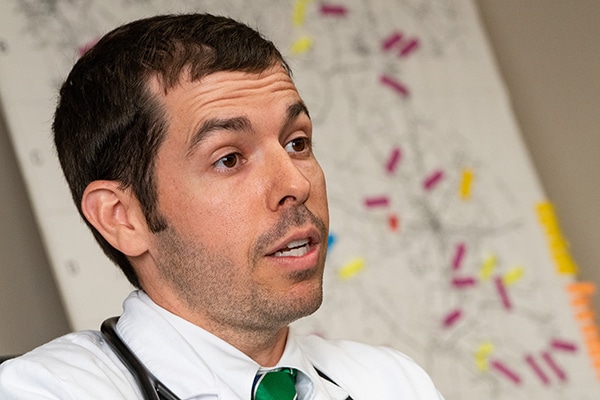
Kornegay began the talk by saying he reminds medical students and residents that practicing medicine in an underserved area is a unique experience that can enhance their views of medicine.
“It’s a good thing, at some point in your career, to spend a little bit of time in community hospitals,” he said.
Kornegay guided the audience through details of the challenges of health care delivery in a rural county, the expertise of his colleagues that blend to provide a more complete level of care to patients and how ECU Health Duplin, in Kenansville, has grown over the years. He also detailed how the Brody School of Medicine has influenced the approach to care.
Duplin County is nearly two hours from Greenville, with a population of around 50,000, making it a target area for Brody’s mission to serve rural eastern North Carolina and underserved communities.
“Brody had several mission statements when it was developed,” Kornegay said, “and one of the main mission statements was to train providers for eastern North Carolina. Primary caregivers are a really big issue, and we hope we’re addressing that somewhat.”
Kornegay said the health care landscape and its indicators — including that many providers are near or at retirement age — mean recruitment to rural communities needs to increase. Other challenges include patient insurance coverage and the geographical access to complex care facilities.
Kornegay praised ECU Health Duplin’s strong ties to the Brody School of Medicine, including current students and residents as well as seasoned physicians.
“We take kind of a plethora of Brody learners,” he said. “We have third- and fourth-year residents that come to do community rotations with us. This past year, we’ve also started taking ECU rural family medicine residents. All of our attendings have interactions with Brody learners and are kind of staying connected.”
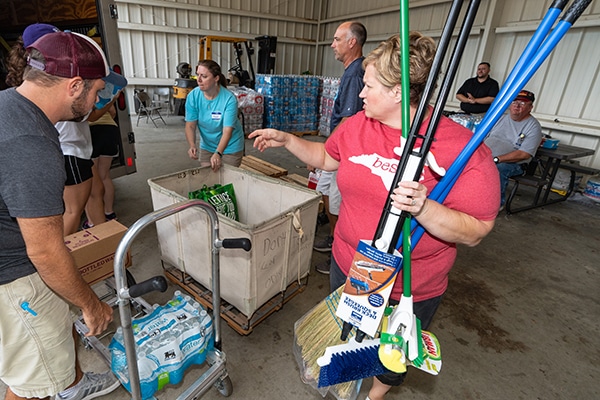
Kornegay’s brothers, who also practice in eastern North Carolina, went to medical school or completed residencies through Brody. Chad Kornegay helped start the medical group in Duplin County in 2010.
“My dad’s been a family practitioner in the area for over 50 years,” Kornegay said, adding that his father retired a few years ago.
The family ties also help build a sense of kinship among the professionals that has resulted in a steady increase in patients served and a reputation for quality care.
In 2011, Kornegay said, there were 5,800 patient encounters through ECU Health Duplin; over the past three years, that number has stayed around 15,500.
“So we’ve almost tripled the service there in about 12 years,” Kornegay said. “We’ve grown the service quite a bit. As a pretty strong group clinically, we’ve had a lot more of a comfort level taking patients than they previously had had here.”
Kornegay shared firsthand accounts of what it was like to be a rural physician in a large, rural county. He told stories about bad car accidents, deliveries of premature babies,
and other emergencies that are made more challenging by remote locations. He also shared his experiences serving during several hurricanes that rendered many areas of Duplin County as islands.
Hurricane Matthew in 2016 presented Kornegay with an opportunity to adopt new skills for future storms.
“I grew up in Duplin County, so I’m used to kind of being around tropical storms and hurricanes,” he said. “But we had never seen anything like this in my lifetime, the amount of water that we got with Hurricane Matthew. And so that presents some challenges, some unique challenges, for us in the health care delivery at the county.”
That experience helped prepare Kornegay and other providers for unforeseen circumstances — and for continuing to live and work the mission of Brody and ECU Health to serve rural eastern North Carolina through challenges from geographical access to natural disasters.
“We really as a county had not recovered from Matthew before Florence came,” he said of the 2018 storm. “We had kind of rehearsed a little bit with Matthew, but one of the things we learned during Florence is you can try to prepare for everything, but you can’t. So you’ve got to be ready to modify and change your game plan when data changes and things change a little bit. When you get that curveball, you may have to pivot a little bit.”